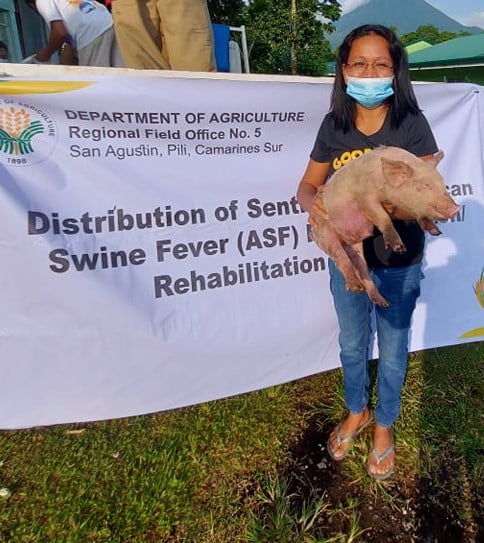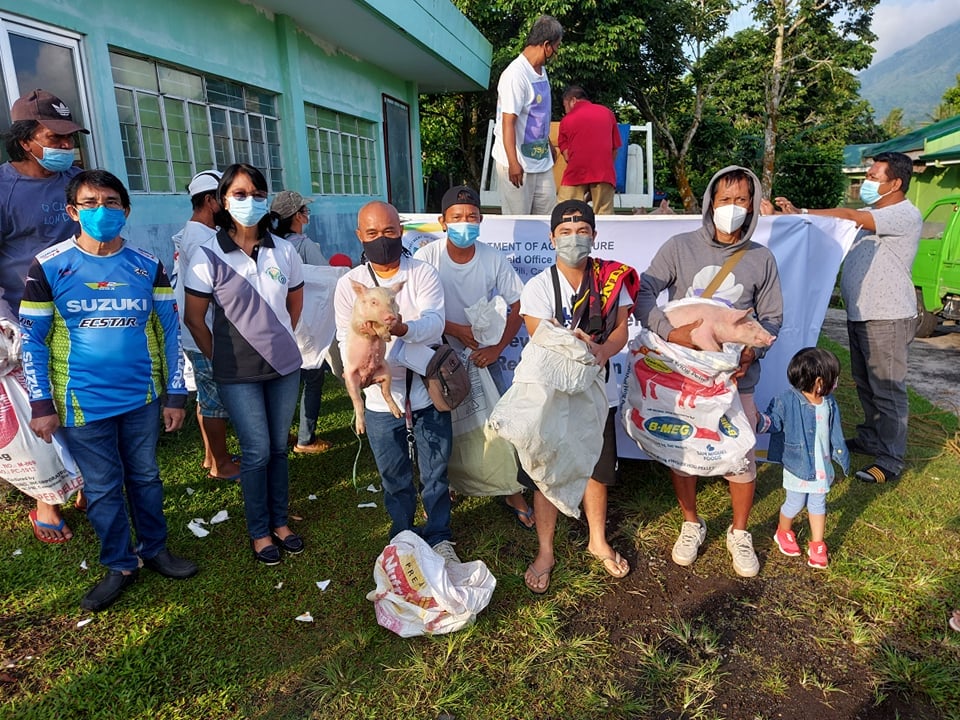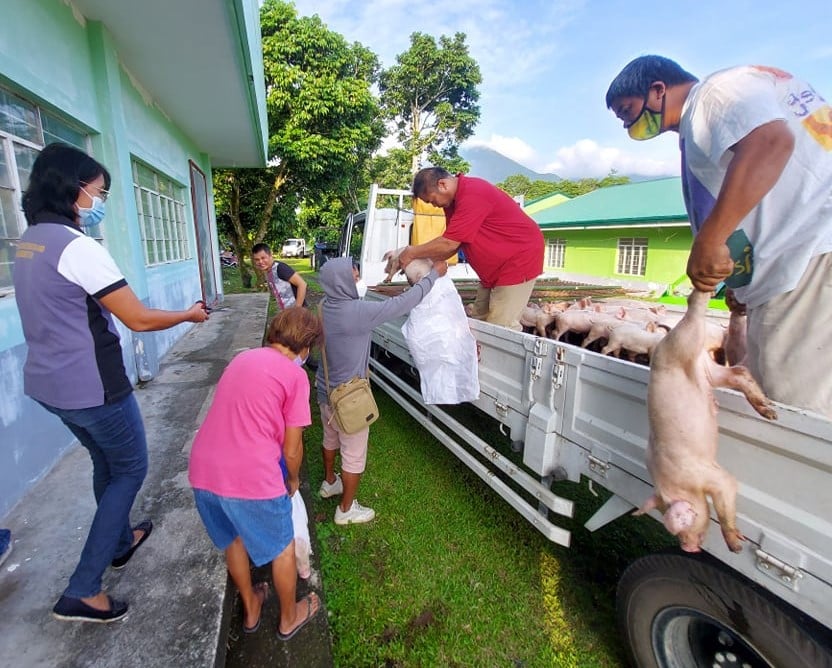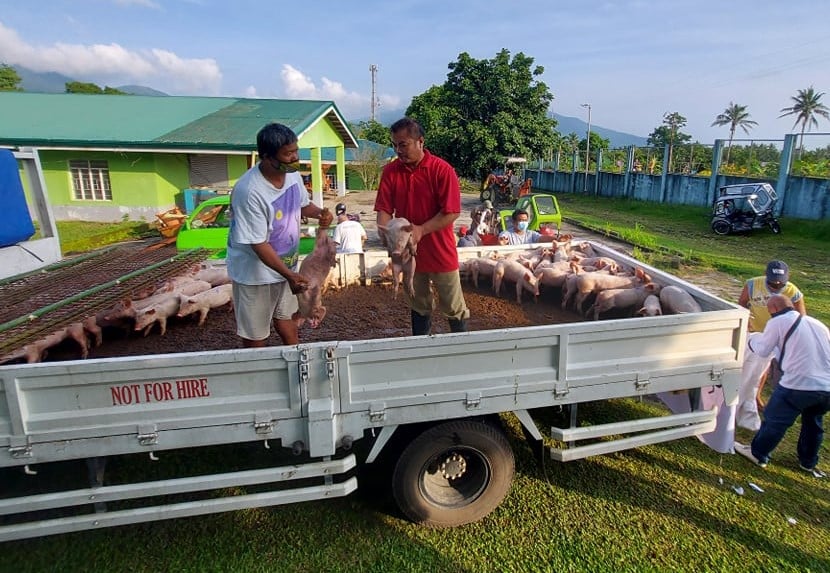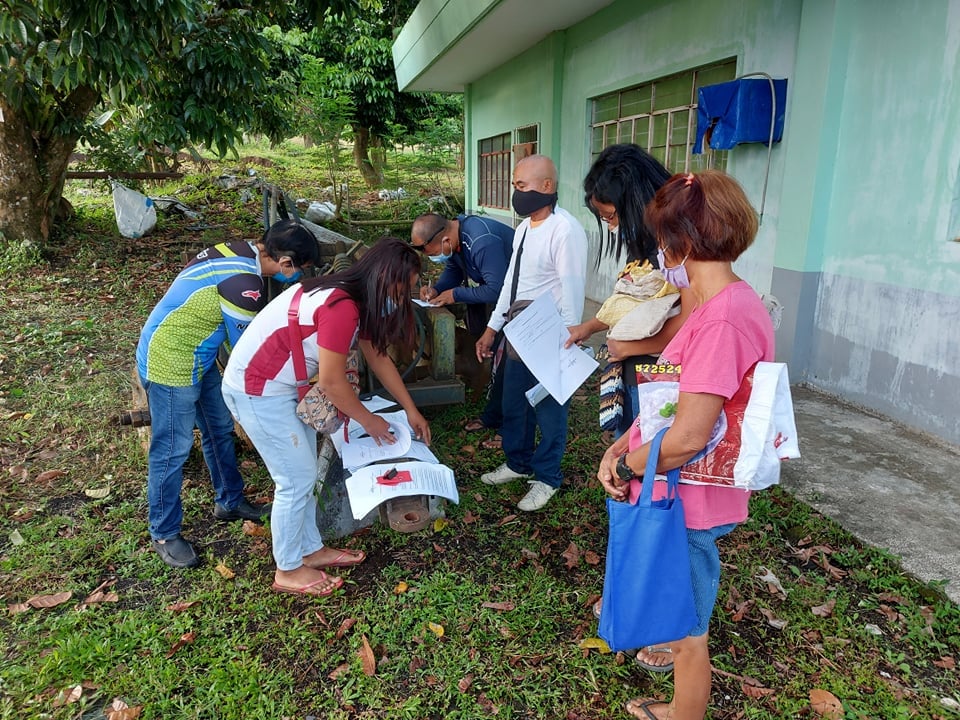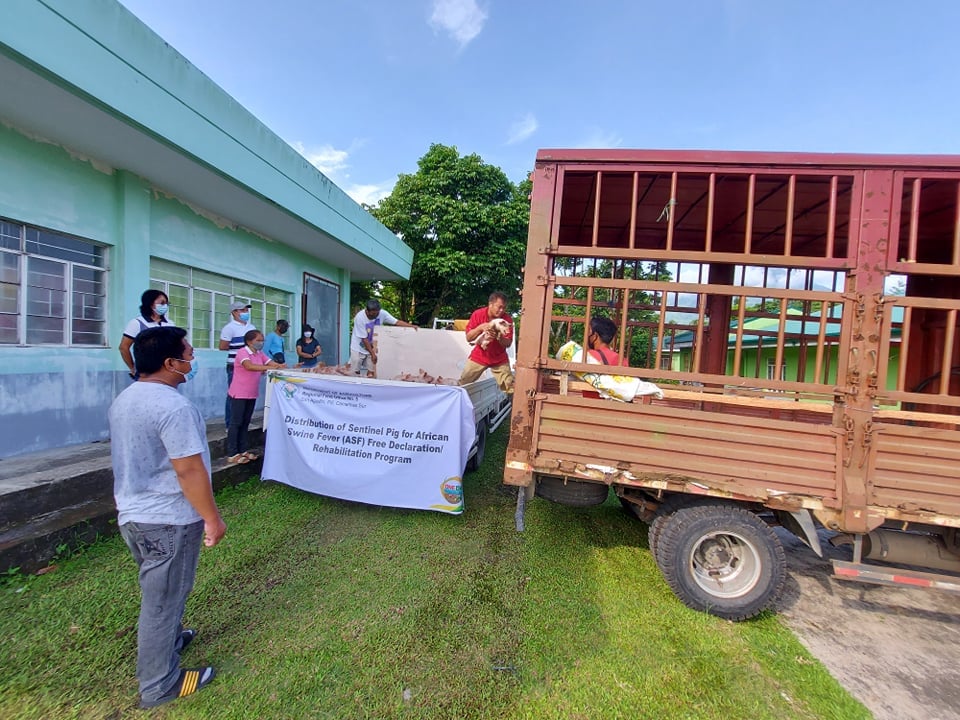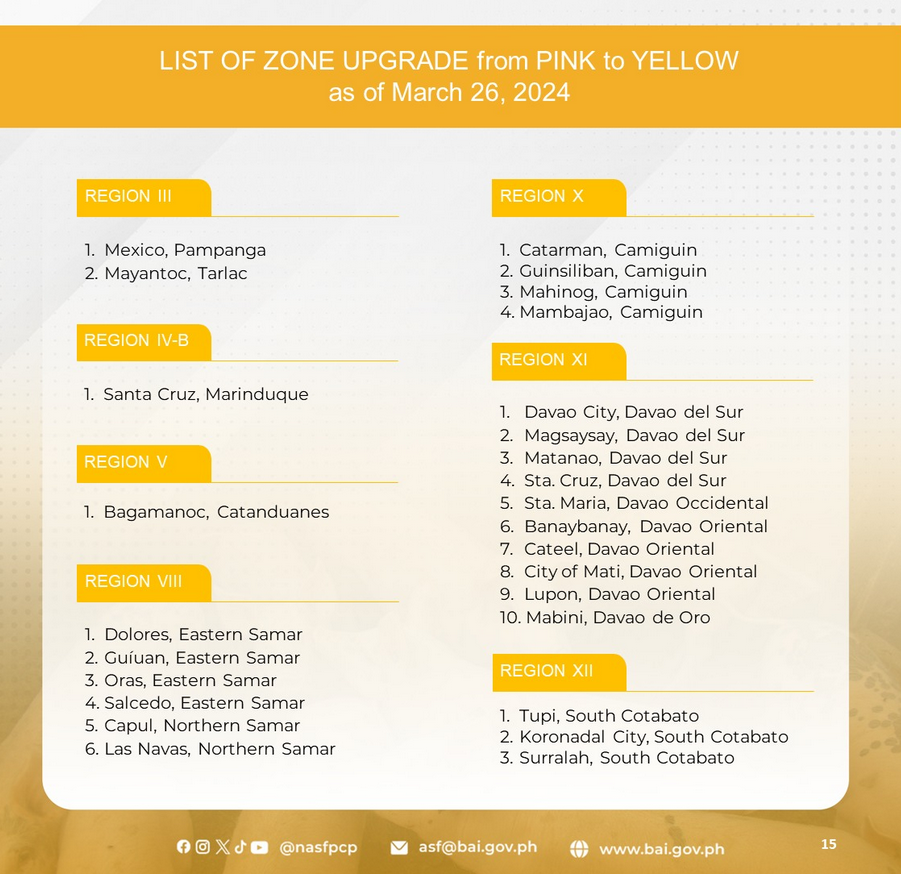
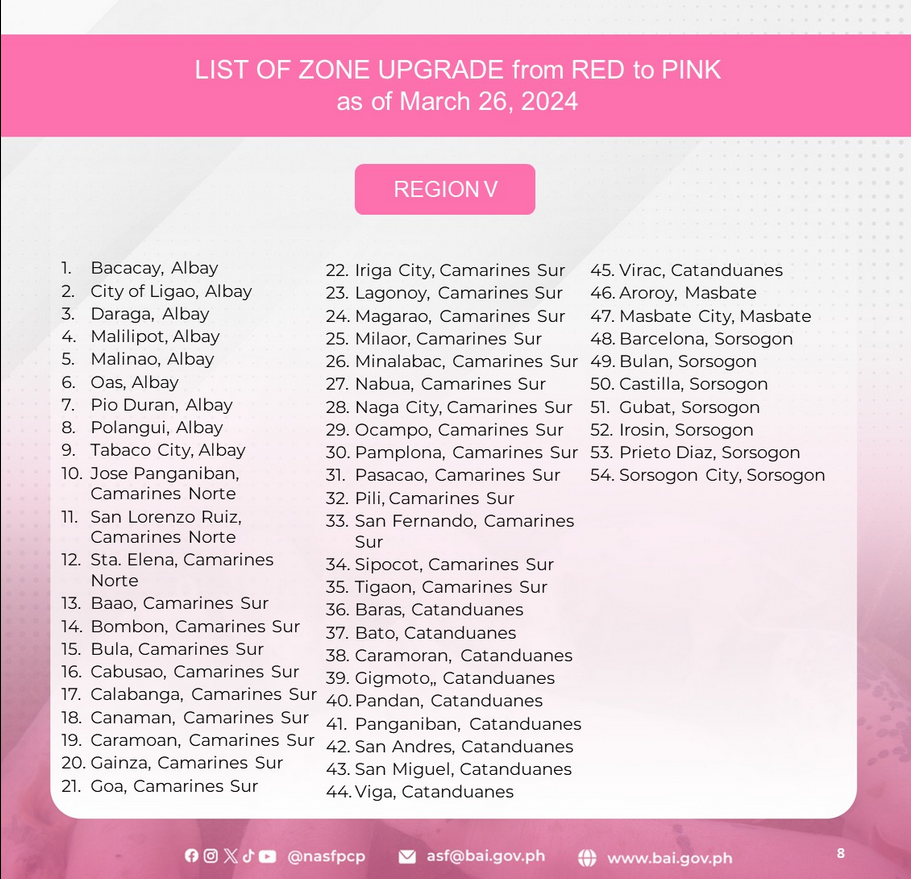
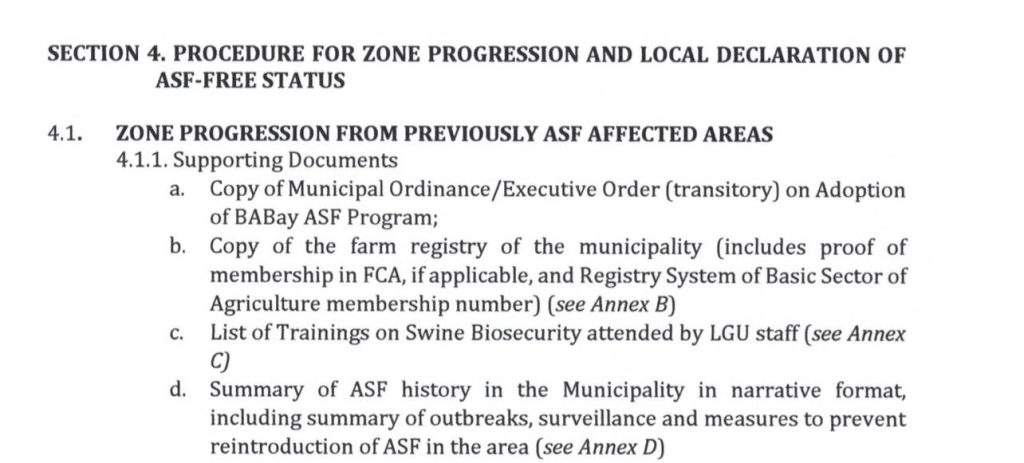
DA Bicol warns the public to buy only ASF-free meat for safe Christmas holidays
(December 8, 2023)
SAN AGUSTIN, PILI, CAMARINES SUR – Christmas is in the air. So is African Swine Fever (ASF) which is recurring from time to time in the previously upgraded pink zones in Camarines Norte and Camarines Sur.
As pork lechon, ham and other pork dishes are the favorite Noche Buena food of many Bicolano families, the Department of Agriculture in Bicol is warning the consuming public to buy only meat from meat vendors who can show a Certificate of Meat Inspection or COMI or Meat Inspection Certificate. Or look for the seal of the National Meat Inspection Service (NMIS) on raw pork meats.
Para “Iwas perwisyo, iwas ASF.”
According to the Food and Agriculture Organization (FAO) of the United Nations (UN), ASF virus can live for 105 days in raw ground pork, 30 days in smoked meat, 300 days in dried meat, 1,000 days in frozen pork meat, 182 days in salted meat, 110 days in chilled meat, 105 days in offal, 300 days in skin and fats of raw meat, 18 months in blood stains in refrigerators, 15 days in blood of infected hog and 11 days in manure of ASF affected hog.
Refrain from buying processed meat from ambulant vendors whose product source is not known, as the products might be coming from infected areas. Safe meats are those butchered at accredited slaughterhouses. For meat processors, do not buy meat from ASF-affected areas and do not process double-dead meat from a pig that has died of disease, particularly ASF. Maintain the cleanliness in the working area by regular cleaning and disinfection.
For the hog raisers, do not feed hogs with kitchen wastes as these might be contaminated with animal diseases such as ASF. A hog that has eaten food (swill) that is contaminated with ASF will surely get infected and it will infect not only the whole hog population in the farm but also those nearby piggeries within 1-kilometer radius.
Some hogs will not manifest symptoms of ASF until 4 to 19 days. According to the World Animal Health (WOAH), the incubation period of the ASF virus is 4-19 days. Some ASF-infected hogs show symptoms such as red, discolored skin or skin lesions, diarrhea, vomiting, high fever, difficulty breathing, heavy discharge from the eyes and nose, and loss of appetite. Infected hogs may die within 2 to 10 days, and oftentimes, mortality is 100% of all hog population.
If any of this happens or is observed in the piggery, immediately report to the Municipal Agriculture Office so that blood collection will be carried out by the municipal veterinarian or extension worker and the blood samples will be sent to the DA RFO 5 Regional Animal Disease Diagnostic Laboratory (RADDL) to identify the disease.
There is no cure for ASF yet. The least we can do is prevent it by observing strict biosecurity measures. Clean and disinfect the piggery every day using bleach. Do not let viajeros or other unauthorized persons inside the piggery. The Veterinary Quarantine Service has previously identified pick-up points of hogs along the national roads so that hog dealers or viajeros need not go to individual piggeries.
As of December 8, there is a reported ASF case in Bgy. Mabini, Libmanan, Camarines Sur. There are also positive cases in Bgy. Pawala and Tagbak in Donsol, Sorsogon; and Bgy. Umabay Exterior in Mobo, Masbate. Surveillance, cleaning and disinfection are being carried out in these areas.
In Camarines Norte, 17 barangays from seven towns namely: Daet, Labo, Basud, Mercedes, Vinzons, Paracale, and San Vicente have ASF cases.
Some 178 hogs owned by 45 hog raisers were depopulated by the respective LGUs and Provincial Veterinary Offices from November 14, 2023 to December 6, 2023.
On November 30, 2023, DA Bicol Regional Executive Director Rodel P. Tornilla sent the DA Regional Quick Response Team headed by Regulatory Division Chief, Rosita Imperial to Daet, Camarines Norte to establish an ASF Command Center for two weeks to help in the depopulation, surveillance, cleaning and disinfection and establishment of animal checkpoints. The RQRT also had a dialogue with Governor Ricarte Padilla, Vice Governor Joseph Ascutia, Provincial Veterinarian Ronaldo Diezmo, and the Municipal Agriculturists of the 12 towns of Cam. Norte. Dr. Alex Templonuevo, NMIS Regional Director also provided disinfectants and carried out the disinfection of slaughterhouses in affected municipalities.
Since 2021, the indemnification program for ASF-affected hogs was transferred to the Philippine Crops Insurance Corporation (PCIC). Under the PCIC Livestock Insurance Program, RSBSA-listed swine raisers are qualified to insure for free and to receive indemnification of up to P14,500 per head for swine breeder (1-10 head maximum) and up to P10,000 for swine fattener (1-20 heads maximum).
The DA is implementing the Bantay ASF sa Barangay or BABay ASF program in collaboration with the Local Government Units that are mandated to enact and implement local ordinances to prevent and control ASF.
All sectors of society – the consumers, hog raisers, meat vendors, viajeros, and the LGUs – have vital roles in the prevention and control of ASF. (Lovella P. Guarin – RAFIS 5)
LGUs of Bicol do their share in the fight against ASF
February 14, 2023
SAN AGUSTIN, PILI, CAMARINES SUR – Several provincial and city/municipal LGUs in Bicol have step up efforts in support of DA’s Bantay ASF sa Barangay (BaBay ASF) Program to control the African Swine Fever that has infected 65 cities/municipalities of the region in 2020-2021.
As of this writing, 39 cities/municipalities of Bicol are officially recovered from ASF and progressed from red zone to pink zone, following complete surveillance and monitoring and implementation of the sentinelling program of DA.
Zone progression from red to pink zone by the Bureau of Animal Industry (BAI) requires the LGUs to submit a copy of municipal/city ordinance or executive order on the adoption of BaBay ASF Program; city/municipal farmers’ registry including proof of the existence of farmers’ coops or associations, if there is any and RSBSA registration; summary of ASF history in the municipality including outbreak, surveillance, and disease control measures; and list of training on Swine Biosecurity attended by farmers and LGU staff.
Aside from active surveillance in areas affected by ASF, the LGUs also shouldered the indemnity for hogs culled due to ASF.
In Camarines Norte, the cash assistance for ASF-affected swine raisers was already distributed by the Provincial LGU of Camarines Norte last January 30, 2023. The distribution was held in Daet, Camarines Norte where 120 swine raisers received P5,000 each amounting to P600,000 . The beneficiaries were those affected by ASF starting in January 2022 when the payment of indemnification was transferred to PCIC.
In Sta. Magdalena, Sorsogon, the MLGU provided P5,000 indemnity each to some 125 farmers totaling P625,000.00. The amount of P290,000.00 came from the LGU funds and the remaining P335,000.00 was provided by the Department of Social Welfare and Development Assistance to Individuals in Crisis Situations (DSWD AICS).In Irosin Sorsogon the PLGU/MLGU paid P3,917,000.00 indemnity to 66 farmers for all hogs that were depopulated. The MLGU provided the amount of P1,802,000.00 and the remaining P2,115,000.00 was shouldered by PLGU.
In Calabanga, the LGU will pay P100,000 to 5 farmers whose swine were culled recently due to the ASF incursion in a backyard farm in Sto. Domingo, Calabanga, Cam, Sur.
Starting in 2021 the indemnification program for ASF-affected hogs was transferred to the Philippine Crops Insurance Corporation (PCIC). The PCIC swine insurance program offers free premium payments for backyard hog raisers and discounted premiums for commercial hog raisers. Under the PCIC Livestock Insurance Program, RSBSA-listed swine raisers are qualified to insure for free and to receive indemnification of up to P14,500 per head for swine breeder (1-10 head maximum) and up to P10,000 for swine fattener (1-20 heads maximum).
Previously, the DA Bicol has mobilized its resources to help the local government units address ASF problems in their respective areas. The DA Bicol has paid a total of P87.9 Million as indemnification to 3,530 hog raisers who were affected by ASF from 2020 to 2021.
The DA Bicol has also distributed 2,195 sentinel pigs to 2,192 farmers and is halfway through its calibrated swine repopulation wherein each hog raiser was given 3 piglets and 6 bags of feeds. (Lovella P. Guarin- RAFIS 5)
Bicol’s calibrated swine repopulation nearing completion
January 14, 2023
Three months after the last active African Swine Fever (ASF) case in Bicol was contained, the Department of Agriculture in Bicol is halfway through its calibrated swine repopulation program. The Livestock Program has targeted to distribute 4,275 piglets to the hog raisers previously affected by ASF to propel the hog industry towards complete recovery.
According to Dr. Marissa Guillermo, Livestock Program regional coordinator, a total of 3,345 piglets have been distributed to 23 municipalities as of this writing. Ten (10) municipalities in Cam. Sur; 9 in Albay; 1 in Cam. Norte; and 3 municipalities in Sorsogon.The hog raisers from Pili, Cam. Sur were the latest recipients of the 2-month-old piglets which were distributed at the LGU offices. Three heads of piglets were given to the smallholder or backyard hog raisers supported with six bags of feeds (3 starter feeds and 3 grower feeds) to help them start anew in their livelihood.
The piglets are being distributed to the beneficiaries from municipalities that had no reported ASF cases for at least 80 days. To date, 36 towns/cities are in the pink zones or ASF-free, out of the 65 towns/cities that battled ASF from 2020 to 2022. The rest are waiting for ASF free declaration upon their submission of pertinent documents for zone progression, such as a copy of the municipal ordinance/executive order on the adoption of BaBay ASF Program; a copy of the farm registry of the municipality; a summary of the ASF history in the municipality (outbreaks, surveillance and disease control measures); and list of training on Swine Biosecurity attended by hog raisers and LGU staff. The DA’s Calibrated hog repopulation and Bantay ASF sa Barangay (BABay ASF) program are in partnership with the local government units (LGUs), hog raisers’ groups and the private sector.
The zero ASF incidence in Bicol is a result of the strict surveillance and monitoring efforts being conducted by the DA Bicol in collaboration with the Bureau of Animal Industry, the provincial and municipal LGUs as well as barangay officials, hog raisers’ groups, and the private sectors involved in the swine industry. (LOVELLA P. GUARIN – RAFIS 5)
DA –Bicol continues to give sentinel piglets, feeds to ASF-affected farmers in 1D Albay
TABACO CITY—The Department of Agriculture (DA) Bicol has distributed “sentinel” piglets in areas where there are no reported cases of the African Swine Fever (ASF) for at least 90 days in the towns of Tabaco, Malinao, Bacacay and Malilipot benefitting 117 small hog raisers who have been affected by the ASF outbreak last year.
According to DA-Bicol Livestock and Poultry Program Regional Focal Person Dr. Marissa Guillermo, the distribution of these piglets is geared towards swine repopulation. Once an area has been declared ASF–free, it can now proceed to swine repopulation thus, increase hog production, provide income to animal raisers and stabilize the prices of pork.
Guillermo added that sentinel protocol will determine if a virus or disease is still present in the area. The sentinel pigs which will be closely monitored for 40 days will serve as test animals to determine if the ASF is no longer present in the area which shall be one of the basis for the declaration of said area as ASF free.
Each raiser will receive a sentinel piglet weighing 15-20 kg each and a starter feed for free. Each municipality will also receive disinfection paraphernalia. The sentinel piglets were sourced from ASF-free farms and subjected to tests.
Aside from the piglets and starter feeds, ASF-affected farmers already received their indemnification assistance of Php5,000.00 for every culled swine at a maximum of 20 swine per farmer.
DA Bicol L&P Program staff Marianito Tesorero added that LGUs will provide technical assistance and monitor the sentinel pig. He added that in to have a successful sentinelling program, entails strict implementation of biosecurity measures in the farm.
According to Dr. Manny G. Victorino, there were no outbreaks recorded since March this year because of the support and cooperation of private and government agencies, LGUs and the stakeholders.
The first reported case in the province of Albay was in September 22, 2020 in Pioduran which affected 27 barangays in nine municipalities and cities. A total of 1,219 hogs were depopulated.
Other municipalities in the province which already received same intervention were Pioduran, Polangui, Ligao City, Daraga, and Oas. A total of 170 sentinel piglets were distributed in the whole Albay province. (jaysonmgonzales)
